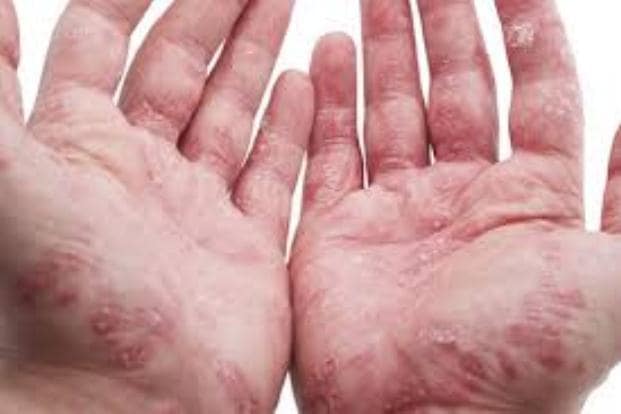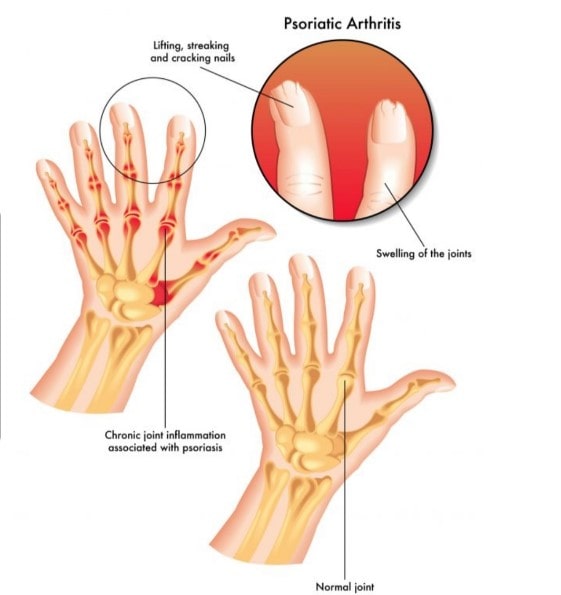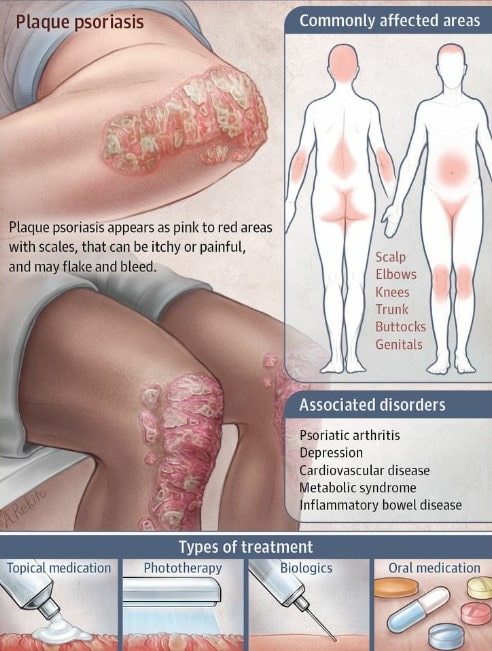Psoriatic Arthritis

Psoriatic Arthritis
What is Psoriatic Arthritis?
Psoriatic arthritis causes inflammation in and around the joints. It usually affects people who already have psoriasis, a skin condition that causes a red, scaly rash, especially on the elbows, knees, back, buttocks and scalp. However, some people develop the arthritic symptoms before the psoriasis, while others will never develop the skin condition. Psoriasis can affect people of any age, both male and female, but psoriatic arthritis tends to affect more adults than young people. People with psoriasis may also have other types of arthritis, such as osteoarthritis or rheumatoid arthritis, but these aren’t linked to the psoriasis.
What are the causes of Psoriatic Arthritis?
The arthritis and the skin condition are both caused by inflammation. The processes of inflammation are very similar in the skin and the joints. We don’t yet know exactly what triggers the inflammation in psoriatic arthritis,although a particular combination of genes makes some people more likely than others to develop psoriasis and psoriatic arthritis.
Research suggests that something – perhaps an infection – acts as a trigger in people who are already at risk of this type of arthritis because of the genes they’ve inherited from their parents. No specific infection has yet been found, and it may be that a variety of infections can trigger the disease, for example bacteria that live in patches of psoriasis.
Sometimes the arthritis can follow an accident or injury, particularly if it affects a single joint. People who are overweight are more at risk of developing both psoriasis and the arthritis linked with this.


What are the symptoms of Psoriatic Arthritis?
Symptoms can include:
- pain and stiffness in and around the joints
- swollen fingers or toes (dactylitis),caused by inflammation in both joints and tendons
- buttock pain, a stiff back or a stiff neck, which is caused by inflammation in the spine (spondylitis)
- pain and swelling in the heels, caused by inflammation where the Achilles tendon attaches to the bone
- pain in other areas where tendons attach to bone (enthesitis), such as the knee, hip and chest Base of spine Knees All joints of toes About one in 50 people have psoriasis, and of these about one in five will develop psoriatic arthritis.
- pitting, discoloration and thickening of the nails
- fatigue, which can be caused by the activity of the disease and the emotional effects that come with living with a long-term condition.
How is it diagnosed?
It’s important that psoriatic arthritis is diagnosed early so treatment can be started as soon as possible. There’s no specific test for psoriatic arthritis, but the diagnosis is based on your symptoms and a physical examination. Your doctor will check for psoriasis and may ask if there’s a history of psoriasis or psoriatic arthritis in your family. People with psoriasis may be regularly asked about joint symptoms by their GP and/or dermatologist.
If several joints are affected, your doctor will consider features such as the pattern of arthritis – that is, which joints are affected. It can be difficult to tell the difference between psoriatic arthritis and rheumatoid arthritis, but blood tests such as those for rheumatoid factor and anti-CCP antibody can help. Psoriatic arthritis can have similar symptoms to gout, so x-rays of your back, hands and feet may also be helpful, as psoriatic arthritis can affect the bones and joints in these areas in a different way to other conditions. Other types of imaging, such as MRI and ultrasound scans, may help to confirm the diagnosis.
What treatments are there?
A team of healthcare professionals is likely to be involved in your treatment. Consult Rheumatologist who primarily sees the patient and decides the treatment plan.
- a physiotherapist, who can advise on exercises to help maintain your mobility
- an occupational therapist, who can advise on protecting your joints from further damage, for example, by using splints or altering the way you perform tasks to reduce the strain on your joints
- a podiatrist, who can assess your footcare needs and offer advice on special footwear.
How will Psoriatic Arthritis affect body?
Psoriatic arthritis doesn’t usually affect major organs such as the liver or lungs. However, you may be more likely to develop a painful red eye. If this affects you, it’s important not to ignore it. These symptoms may be caused by a condition called uveitis, also known as iritis, which inflammation at the front of the eye. Discuss this with your doctor who should help you recognize these symptoms, and explain what you should do if it occurs.
People with psoriasis and psoriatic arthritis may also have a slightly greater risk than other people of developing heart disease, so it’s important to address anything that could add to this risk, such as smoking, high alcohol intake, being overweight or blood pressure problems. although a particular combination of genes makes some people more likely than others to develop psoriasis and psoriatic arthritis.
Research suggests that something – perhaps an infection -acts as a trigger in people who are already at risk of this type of arthritis because of the genes they’ve inherited from their parents. No specific infection has yet been found, and it may be that a variety of infections can trigger the disease, for example bacteria that live in patches of psoriasis.
Sometimes the arthritis can follow an accident or injury, particularly if it affects a single joint. People who are overweight are more at risk of developing both psoriasis and the arthritis linked with this.
Living with Psoriatic Arthritis
Any long-term condition can affect your moods and confidence, and it can have an impact on your work, social life and relationships. Talk things over with a friend, relative or your doctor if you do find your condition is getting you down. You can also contact support groups if you want to meet other people with
psoriatic arthritis.
If you smoke, it’s important to try to stop – as well as stopping smoking being good for your health in general, smoking can make several forms of psoriasis worse. Speak to your doctor for advice on stopping smoking.


